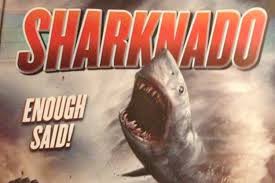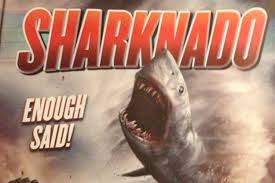Guy DeBord or Sharknado?


At Pacific Standard, Amanda Hess wrote a mesmerizing piece on the Asylum, the ultra-low-budget B-movie studio that produced last night’s Twitter-bomb Sharknado as well as 2-Headed Shark Attack and a host of big-studio ripoffs like Transmorphers, Battle of Los Angeles (ideally conflated with Battle: Los Angeles) and American Warships (nestled neatly next to Battleship at Redbox and on your Netflix queue). These movies are drafted in ten days, have budgets as low as $100,000 and are intentionally naive about their own inanity: “I wish we could be more self-aware when we’re making these movies, but it’s, like, a rule,” one of the filmmakers is quoted as saying.
The people at the Asylum are well aware of the risible-to-detestable spectrum that their movies inhabit; the 25-year-old producer of Sharknado sums up the typical criticism as, “I hope everyone involved in this production dies and their families die.” But these movies, willed into existence by market algorithms, are still getting made and watched and iterated.
In these troubling times, we must turn to our Marxist critical theory. Here is a selection of unmarked quotes from both Hess’s article and Guy DeBord’s “Society of the Spectacle,” which is really the only think piece on Sharknado that we need; call this a Sharktopus of block text, or perhaps just never willingly participate in the world again, which is the option that I am considering.
In societies where modern conditions of production prevail, all of life presents itself as an immense accumulation of spectacles. Everything that was directly lived has moved away into a representation.
We appear to be living in a world of unlimited choices, all screened directly into our homes on demand.
In a world which really is topsy-turvy, the true is a moment of the false.
“Carmen Electra is a doctor,” Horton tells me with a mix of glee and disdain. The question is: For the love of God, why? “The short answer is: We don’t know.”
The success of this production, its abundance, returns to the producer as an abundance of dispossession. All the time and space of his world become foreign to him with the accumulation of his alienated products.
We don’t really know the consumer. The consumer is too big and too fractionalized. All we know is we’re making a film for Netflix, and they tell us what they want.
All the goods selected by the spectacular system are also its weapons for a constant reinforcement of the conditions of isolation of “lonely crowds.
If a Japanese DVD company wants a submarine, and Blockbuster needs a monster, the Asylum will make a sailors-meet-sea creature movie.
The spectacle presents itself as something enormously positive, indisputable and inaccessible. It says nothing more than “that which appears is good, that which is good appears.
“It’s exactly what you think it is — a tornado full of sharks,” he explains. “That movie cannot be bad.”
It doesn’t matter how unwatchable it is.
The spectacle is the nightmare of imprisoned modern society which ultimately expresses nothing more than its desire to sleep. The spectacle is the guardian of sleep.
PS, in (the unlikely) case you were wondering if a sharknado could ever actually happen, Mother Jones has your answer, and it is, as we suspect: no.